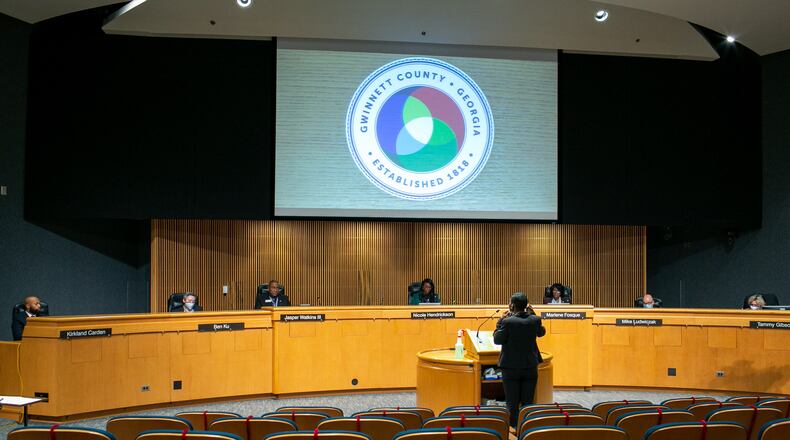Editor’s note: This story has been edited to reflect Gwinnett County Commissioner Kirkland Carden issued his statement against Gwinnett’s Tax Commissioner Tiffany P. Porter’s proposal before he met with her. Carden issued his statement a day before he and Gwinnett County Commissioner Ben Ku met with Porter. He learned of her proposal from city leaders and others familiar with it.
Gwinnett County’s new tax commissioner defended her proposal to collect additional fees from eight cities for handling their property tax collections, responding to criticism in a press release issued Monday afternoon.
Tiffany P. Porter, who was elected in November, intends to charge eight Gwinnett cities $2 per parcel in additional fees. Her proposal would reportedly supplement her current $140,000 salary by more than $110,000, which would make her the highest paid elected county official.
Kirkland Carden, a Gwinnett County commissioner, railed against Porter’s plan in a statement last week, saying the plan would “dramatically increase the financial burden placed on municipalities and taxpayers” at a time when city budgets “have already been devastated by the impact of the COVID-19 pandemic.”
“These changes are unnecessary and not a responsible use of taxpayers’ money,” Carden said. “As a leader who believes in putting the people first, I will not support these changes.”
Credit: Rebecca Wright for the Atlanta J
Credit: Rebecca Wright for the Atlanta J
Porter justified collecting additional fees from cities, questioning the “morality of additional responsibility without additional compensation” from the cities who use her office for tax collection. She said she’s content with her salary and job as the county’s tax commissioner, deserving compensation to handle taxes for cities.
“To be clear, servicing the cities isn’t just printing some extra lines on a bill; it’s that plus creating individual calculations, databases, records, reports, plus audits and other special assessments and fees that are unique to each city,” Porter said.
In her Monday statement, Porter called Carden’s comments “premature,” claiming they “demonstrate ignorance about the work and role of the tax commissioner and the fair distribution of costs between county and city taxpayers.” She also critiqued news outlets for positioning the topic as a “greedy pay raise.”
Porter added that Carden’s comments came before her scheduled meeting with county officials to explain her proposal.
Carden learned about Porter’s proposal from city leaders and other parties familiar with it, he said, issuing a statement a day before he and Gwinnett County Commissioner Ben Ku met with Porter to personally discuss it. Porter has not tried to coordinate a meeting with the Board of Commissioners as a whole to discuss the plans in depth, Carden said.
In response to Porter’s statement, Carden said that he still believes the proposal comes at a time while people are still hurting from the pandemic. “Ultimately, I believe the citizens of Gwinnett can decide whether or not they think it’s acceptable for the tax commissioner to personally pocket an estimated $110,000 of their money,” he said.
It costs $1.80 per parcel to take care of a city’s tax billing, Porter said, in addition to the county’s average cost of $16.18 per parcel. In 2020, cities paid an average of $1.56, resulting in a county-taxpayer subsidy of $16.42 per parcel, she said.
Cities would pay the full $1.80 per parcel cost to the county under Porter’s 2021 proposed contracts, in addition to the $2 per parcel fee paid to her.
“I believe it’s right and fair to receive a fee for shouldering more responsibility,” said Porter, adding that the bank accounts for the $1.6 billion in annual tax collections are in her name.
Porter’s office collects taxes for eight Gwinnett cities: Berkeley Lake, Dacula, Grayson, Lawrenceville, Lilburn, Peachtree Corners, Snellville and Sugar Hill. Three cities have verbally agreed to the new fees, Porter said. It’s unclear which cities have agreed, as her office did not respond to requests for comment by time of publication.
“Let’s not forget that municipalities are struggling during this time,” Carden said. “When we had the shutdown and courts were shut down, that was money that they missed out on from court fees and traffic citations, all while having to provide PPE and public health services. As I said before, I don’t think this is the time to do so.”
Sugar Hill Mayor Steve Edwards personally called Carden to let him know that he “vehemently” opposes Porter’s proposal, Carden said.
The Atlanta Journal-Constitution previously reported that other cities, including Lawrenceville and Snellville, were concerned by the new fees. Snellville City Manager Butch Sanders called the increase “troubling and unexpected” last week, saying the cost to Snellville would be more than three times what the city currently pays.
The tax commissioner’s office gave the Gwinnett County Board of Commissioners a May 4 deadline to consider the new city contracts, Carden said. He added that some Gwinnett cities are currently in negotiations to present a counteroffer to Porter’s proposal.
While Porter’s move is currently legal, the county’s previous tax commissioner, Richard Steele, did not collect personal fees from the cities. “I don’t mind being the first Gwinnett tax commissioner to stand up for extra pay for extra work,” Porter said. “I’ve been doing firsts my whole life. I will endure the accusations and watch how it plays out – for myself and all who follow after me.”
Fulton County Tax Commissioner Arthur Ferdinand has imposed similar fees to the ones proposed by Porter. In 2019, The Atlanta Journal-Constitution reported Ferdinand made $491,193; his base salary was $161,312.
Ku issued a statement Tuesday urging Gwinnett’s state legislators to pass legislation to ban tax commissioners from supplementing their own salary through tax collections.
“But if that is not possible at this time, I encourage them to at least address the practice in Gwinnett County,” Ku said. “If legislation fails and the tax commissioner believes an additional supplement is necessary, I would ask that it be a fully transparent separate line item on the tax bills.”
Last week, Rep. Nikki Merritt (D-Grayson) said she was prepared to file local legislation if needed to curb Porter’s plans.
Porter said the proposal would still benefit the cities, as they’d likely pay higher prices to take care of their own tax collections. While unhappy with Porter’s plan, Peachtree Corners officials acknowledged at a recent council meeting that it would cost the city more to collect its own taxes.
“The county stands to lose $99,000 if commissioners reject the city contracts, and cities will lose an extremely favorably deal,” Porter said. “If legislators change the laws, it will simply mean that cities get a nearly free ride on the backs of county taxpayers and the shoulders of the tax commissioner.”
About the Author
Keep Reading
The Latest
Featured



